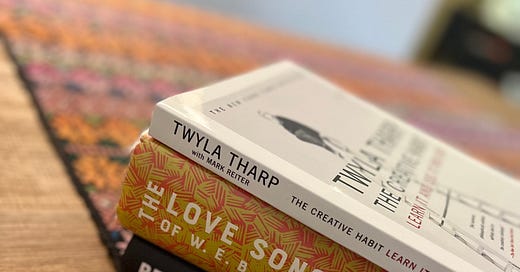If you're like me, you're looking to get into both some good fiction and non-fiction in 2023. So, here’s my completely unscientific, non-genre specific list of books to start you off. Enjoy, and get your multi-passionate groove on.
The World We Make, by N.K. Jemisin
Probably, it’s not the best idea to start this list with a sequel; but this is my top book for 2023. Part two in N.K. Jemisin’s duology about human avatars of NYC boroughs*, if you haven’t read the first book (The City We Became), you'll want to start there. The world-building is this novel is incredible, and the social commentary is spicy.
Becoming Abolitionists, by Derecka Purnell
If you’re seeking to deepen or recenter your political praxis for the long-term work of building a more just society post-2020, or to understand one of the critical social issues of our time, this is a great place to dive in in 2023.
Hell Bent, by Leigh Bardugo
Skip this if you don’t like creepy. I’m not a fan of creepy myself. Unfortunately, the storytelling in this Leigh Bardugo novel is so compelling that I’m forced to be semi-obsessed with this series about the macabre. It’s set at Yale and I get the sense that if you went to school there or live in New Haven the references are pretty on point. The protagonist is compelling, and the book is currently keeping me up at night. This is another sequel so if you haven’t read it, you probably want to start with the first book, Ninth House.
Overcoming Debt, Achieving Financial Freedom, by Cynthia Zuniga-Sanchez
Pivoting genres again, this is the most interesting and useful “financial empowerment” book I’ve come across. In fact, I think the whole genre can often cause more harm than good. In this case though, the author Cindy Zuniga-Sanchez provides actionable and helpful information, and the book is specifically geared toward readers who are working class, people of color, children of immigrants, and/or women - in other words, folks who are typically marginalized by larger economic systems and excluded from relevant information on building financial freedom.
Plus, she appeared on The Millennial PhD podcast at the beginning of last season, and the episode was fire.
The Invisible Life of Addie LaRue, by V.E. Schwab
Finally a stand-alone novel! Addie LaRue avoids arranged marriage in 1700s France by making a “deal with the devil”. She will live forever, but be forgotten by everyone she meets. This is one of the more original story premises I’ve read in awhile. It spans several centuries (the author sidesteps major historical atrocities by having Addie avoid the places where they’re occurring, so, okay, sure) but a large part of the story takes place in current day New York, and the book is compelling and kind of delightful throughout.
The Love Songs of W.E.B. DuBois, by Honorée Fanonne Jeffers
If you’re on top of your sh*t, you may have already read this one because it seems to be on top of everyone’s list since 2021, but I’m just getting to it in January of 2023. The title features the pre-eminent U.S. sociologist, W.E.B. DuBois, and it’s been hailed (by everyone, it seems) as a compelling portrait of multi-generational Black American life, love, and family ties.
The Creative Habit, by Twyla Tharp
I wanted to include one more nonfiction book geared toward creatives, because I know so many of us embark on new creative projects and dream building in the beginning of the year. It’s easy to critique books like this for their shortcomings - the sociologist in me cringes at the lack of social/political context. At the same time, these books are popular for a reason. They provide reassurance that our art is worthwhile, and a roadmap to going from dream to plan to reality. And, I like this one. We need your art and creativity in 2023 - so check out this interesting take on what it takes to sustain your creative energy.
Have you read any of these? Love them? Hate them? Plans to get to them? Let the people know in the comments below.




